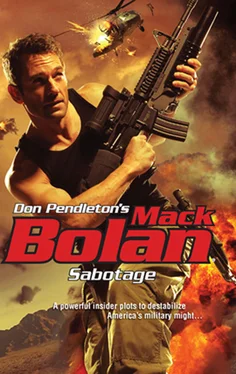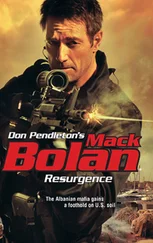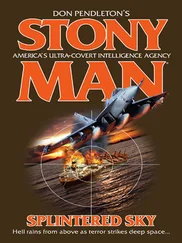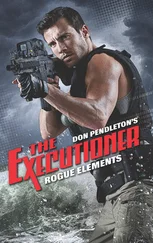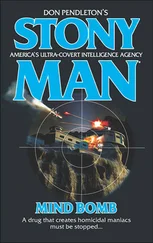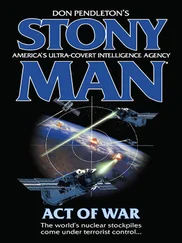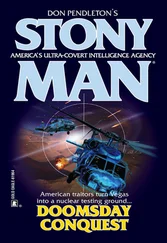The slight, dark-haired, sallow-skinned and physically gaunt Mak Wei was more of a mystery personally, but his personal motivations were irrelevant. Mak was a Chinese operative, and thus he did as he was told. His goals were the goals of his government. In this case, Communist China wanted very much to see the power of the United States diminished, so much so that it was willing to risk running black operations such as Mak’s current mission. The agent was funneling Chinese equipment and munitions to Twain’s mercenaries, and providing Chinese security personnel of his own to augment Twain’s forces. Both men, working in concert, pursued the goals Trofimov set for them. Mak was smart enough to know that Trofimov’s master plan was sound but, more important, he knew he had to allow for a certain degree of distance between his government and Trofimov. That meant that whenever possible, he would defer to Trofimov so that his government wasn’t directly involved in the violent actions that resulted.
Trofimov had first made contact with the Chinese through diplomatic back channels years before. Communist China was the last of the truly powerful, centralized command nations. If the world were to have a new superpower, it would have to be China; only China was poised to fill the vacuum that would be left by a faltering United States. At first, Trofimov’s overtures were rebuffed. As he grew in power and influence, however, China’s government began to take notice. Eventually they had assigned Mak Wei to Trofimov, and a very profitable alliance was born. Through Mak, the Chinese supported Trofimov’s efforts. When America ultimately fell, it was the Chinese who would benefit. Trofimov knew that the gratitude he hoped would be shown him by the resulting Chinese superpower wasn’t guaranteed. That didn’t worry him, however. His own power would be as great, if not greater, once America fell. He would be in a position to command China’s respect, if not its thanks. The world order that emerged would be closer to the one he desired, and that was really all that mattered to him. In this manner, Mak and his government were also “useful idiots,” after a fashion. The difference was simply that they weren’t stupid like the peace protesters Trofimov used so easily.
Trofimov finally spoke. “You requested this meeting, Gareth. You tell me what it is you want.”
“It isn’t what I want,” Twain said. “It’s a new wrinkle. A new problem.”
“Then tell us what it is,” Mak Wei said quietly, breathing out a plume of blue-white smoke, “and we can all address it that much more efficiently.”
“You’ve met Kwok Sun.” Twain jerked a thumb toward the man by the door. “Poor bugger’s gone and lost his brother, hasn’t he?”
“Lost him? How?” Trofimov asked.
“Jin was assigned to that bunch out in Wisconsin,” Twain said, “handling the PAAC splinter bunch.”
“They turned on him?” Trofimov asked.
“Nah, nah.” Twain shook his head. “He was ambushed. They moved on the funeral like you wanted. Full kit, armed to the teeth. Only, somebody was waitin’ for them. Shot down every one of the civvies, then ran down Kwok Jin and plugged him.”
“How do you know this?”
“Paid me an informant in the police department out there.” Twain grinned, as if this were the most brilliant maneuver ever conceived. The man’s mannerisms were that of a much less professional killer, and Trofimov knew this for the ruse that it was. Gareth Twain was cunning, vicious and completely pragmatic. He liked to be underestimated. It was habitual with him, Trofimov was sure.
“You are saying your men were intercepted by law enforcement?”
“Are you kidding me?” Twain was suddenly indignant. “First, they wasn’t my men, except for Jin. Second, no cop or even Fed, hell, not even a Royal loyal would ha’ done as this fellow did. Shot them all down without so much as even a by-your-leave, no warnings, no ‘Stop, police,’ or whatever the hell else. Just bang-bang-bang, you’re all dead, and Bob’s your uncle.”
“Spare me the colorful argot,” Trofimov said. “You forget that I know you’re not quite the Irish rube you pretend to be.”
Twain frowned, but wisely said nothing.
“This is an unfortunate complication,” Mak Wei put in, sucking the last of his unfiltered cigarette down to his stained fingers. “It could indicate that we—that you, Trofimov—have finally raised the attention of some governmental or legal entity. The operation could be in danger.”
“Not buyin’ it,” Twain said. “You know who I think it is? I think it’s the Mob. Some competing ‘interest,’ and the kinds of folks who don’t mind plugging a few of the other side’s boys to make a point.”
“That makes no sense,” Mak said disdainfully. “Why would a criminal concern care about political protests or political murders?”
“An investment in the status quo, perhaps,” Trofimov offered. “The Mafia and the CIA once worked together in an attempt to kill Castro, perhaps more than once. There are criminals, and there are patriots. They aren’t necessarily mutually exclusive.”
“Perhaps,” Mak conceded. “But you forget, I have knowledge of operations, of actions against United States interests, that you do not. The methods employed are brutal, yes. They are not consistent with the usual manner in which the Americans do things officially. Unofficially, my government is quite certain that elements at least affiliated with the United States government are quite prepared to use violence, and to use it preemptively and overwhelmingly to protect American interests.”
“What can you tell us about this?” Trofimov asked.
“Only what I have said just now. There are few specifics.”
“Well, that hardly helps us, does it?” Twain snapped. “And in the meantime now I’ve got to watch my back, and yours, and wonder where this trigger-happy goon is going to show next. The entire operation could be compromised.”
“Is that a problem, Twain?” Trofimov asked directly. “Are you saying you aren’t up to the challenge?”
“Not hardly.” Twain grinned wolfishly. “I’m just warning you. It’s going to get bloody.”
“Then let it get bloody,” Trofimov said. “Now go, and do what I pay you to do.”
The neighborhood around the assembly plant outside Cedar Rapids was fairly sparse and largely industrial. Mack Bolan was grateful for that; it reduced the chances of innocents wandering into the cross fire. He parked his rental truck a block away, scanning the area for threats and spectators. He saw no one.
The care package he had requested from the Farm was in a hard-shell case in the back of the truck. It was a Tavor TAR-21 assault rifle fitted with a 40 mm M-203 grenade launcher. The 5.56 mm modular Israeli bullpup-style rifle, which looked like something out of a science-fiction movie. This gas-operated select-fire rifle had a cyclic rate approaching fifteen rounds per second on full automatic. The compact weapon, coupled with the power of the grenade launcher, was just the thing for the mission on which Bolan was embarking.
The soldier made sure his movements were concealed within the rear of the truck, checked his weapons and slung the Tavor along the side of his body. The weapon wasn’t truly concealed, but it didn’t need to be. Bolan intended to make a significant first impression, and fast. He slung his OD canvas war bag across his chest on its broad shoulder strap, making sure his extra magazines, explosives and other weapons were in place in the bag and in the pockets of his combat blacksuit. He didn’t bother to don his field jacket.
A parking lot fronted the assembly plant. Three or four cars were parked here; none of them was remarkable. Bolan gave them a casual glance as he passed, stopping at the double doors to the plant itself. He pushed one open and quietly stuck his head inside, looking left and then right.
Читать дальше
